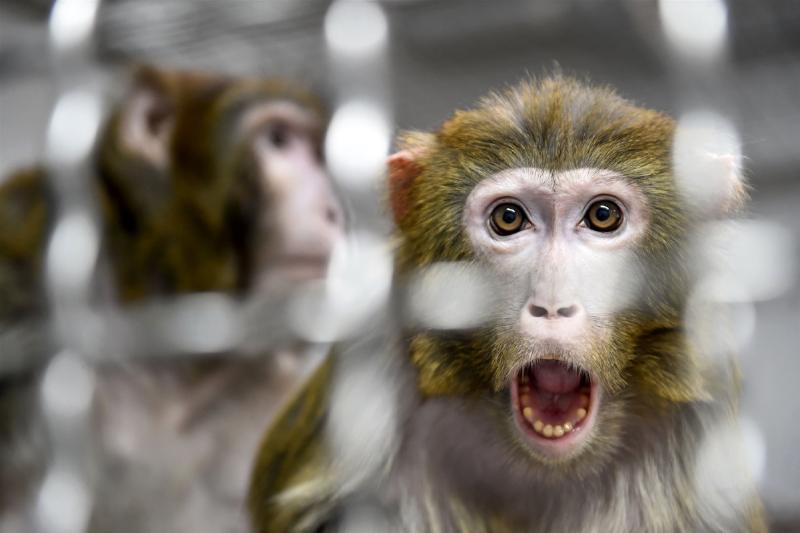Chinese scientists insert human brain gene into monkeys, spark ethical debate



When scientists in China added human genes to monkeys, they were hoping to gain a better understanding of how human brains develop. In the process, they triggered an ethical debate over research that some say blurs the line between humans and animals .
The scientists behind the new research, which was published March 27 in the journal National Science Review , say genetically altered monkeys can advance our understanding of brain development, which could lead to new treatments for autism and other developmental disorders.
But critics of the research — including one scientist who contributed to it — have called foul, arguing that the scientific gains don’t justify the creation of monkeys that could wind up with more humanlike intelligence.
“My personal opinion is now that, from an ethical point of view, such research should actually not be done,” Martin Styner, a computer scientist at the University of North Carolina, Chapel Hill, who was a member of the team of scientists behind the research, told NBC News MACH in an email.
Still others say that, ethical pitfalls and all, genetically altered monkeys are our best hope for unlocking the secrets of the brain and its disorders.
The conflict illustrates what Jessica Mayhew, director of the primate behavior and ecology program at Central Washington University in Ellensburg, calls the "ethical quagmire" of animal testing .
A SIMPLE QUESTION
The research grew out of a simple question: How does our DNA lay out the blueprint for humans’ powerful brains? Specifically, the scientists, based at the Chinese Academy of Science’s Kunming Institute of Zoology, wanted to understand the role of the MCPH1 gene in human brain development.
Babies with malfunctioning copies of the gene are often born with unusually small heads, a condition known as microcephaly . And since the human and monkey versions of MCPH1 are slightly different, scientists think the gene may be partly responsible for humans’ high intelligence.
In the study, the scientists added the human version of MCPH1 to 11 embryos that would become rhesus macaques, dirty-blond monkeys that share about 93 percent of their DNA with humans. The so-called transgenic embryos were then implanted in the wombs of female monkeys.
Two embryos were lost to miscarriage; three more were euthanized before birth so that scientists could examine their brains. Of the six monkeys that were born, one died about two months in. The other five were given memory tests and had their brains imaged in an MRI machine at regular intervals.
The transgenic monkeys behaved much like their unaltered counterparts, and their brains were roughly the same size. But their brain cells took longer to develop compared to those of the unaltered monkeys — a sign that the researchers interpreted as neoteny, the super-slow maturation of the human brain that is thought to be linked to our species’ high intelligence.
They also outperformed the unaltered monkeys on the memory tests and had quicker reaction times.
A LINK BETWEEN SMARTS AND SUFFERING?
The results led some to wonder whether the MCPH1 monkeys were one step closer to something like consciousness .
Styner said he worried that the transgenic monkeys could be shunned by their unaltered counterparts, though he acknowledged that he didn’t observe the animals and had no expertise in genetics or bioethics. Other experts echoed Styner’s concerns.
“I do not think all animal/human genetic hybrid experiments are unethical,” Arthur Caplan, a bioethicist at NYU School of Medicine, said in an email. “Inserting human genes into monkey brains is a different matter.” Like Styner, Caplan felt that the study ran the risk of creating something not human, but not quite a monkey.
But Megan Dennis, a biochemist and geneticist at the University of California, Davis, said the insertion of a human gene probably wasn’t enough to give the monkeys anything resembling self-awareness.
“Rhesus monkeys are far enough evolutionarily from humans that a few additions of genes will not create a 'Planet of the Apes' scenario,” she said, referring to fears that the transgenic monkeys could be self-aware.
BUILT-IN PROTECTIONS
Rhesus monkeys and other Old World monkeys can be a useful model for studying the human brain. Their brains resemble humans’ brains much more closely than those of other common research animals, such as mice. And with 25 million years of evolution separating them from humans, they’re considered less ethically dicey to use in experiments than chimpanzees and other great apes, which share with humans all but a few percentage points of their genomes.
“Rhesus macaques are one of the best animal models for studying brain development and evolution, and have the best translational value for improving human health,” Anthony Chan, a researcher at Emory University’s Yerkes National Primate Research Center, said in an email. But, he added, scientists must tread carefully whenever they add human genes to animals, designing their experiments to keep suffering to a minimum.
In 2015, the National Institutes of Health announced it would no longer support biomedical research on chimpanzees . Research on great apes is either banned or restricted in many places, including nations in the European Union.
In the United States, the National Institutes of Health funds both monkey research and research involving the introduction of human genes into animals. NIH gave 249 grants supporting nonhuman primate research in 2017, Science magazine reported. Still, the research is often cheaper and more convenient in China than in the U.S., making the country a hotbed of genetics research on monkeys .
Another scientist involved in the new study, Bing Su of Kunming Institute of Zoology, said in an email that the institute’s ethics board had approved the study and that the monkeys were handled in accordance with international standards. He added that, apart from the pace of their brain development, the transgenic monkeys weren’t much different from their unaltered counterparts.
“In theory and in reality, there is no ‘humanness’ observed in the MCPH1 transgenic monkeys, since only one gene was changed among tens of millions of genetic differences between humans and monkeys,” he said.
As for the misgivings of his coauthor, Su said Styner never expressed any concerns to him personally, and that when told that their research had been published, Styner emailed back, "Congrats to the whole team!!”
“With two exclamation marks,” Su said.
For his part, Styner said he didn’t make up his mind on the ethics of the experiment until later. “This is the first time where I regret sending out such an congratulatory email,” he wrote when asked about the exchange.
The five surviving monkeys are reported to be in good health.


Did we learn nothing from "Planet of the Apes"?
Notwithstanding what Megan Dennis said in the article:
The "Scopes" Human Trial
Wonder if the Chinese named their #1 test subject Ceasar?
More likely would have been Confucius
Some worry that such research blurs the line between humans and animals.
Not so much that as polluting the Animal Kingdom with our insanity:)
To be fair, humans are animals too. We are members of the animal kingdom.
We're a member of the Primate Order along with the Great Apes
Yes I sadly realize that and yet feel at times that we may very well be a sub-species.
It's both funny and sad how some people (mainly those with theological tenancies) seem to have a problem with or get offended by that.
Oh sorry, when I saw the headline I thought that the monkeys, after the insertion of the human gene, started debating with the scientists about ethics.
ha, good one
The monkeys would probably win!
give them human rights, think of the political benefits.
monkeys will vote for anything if they get free bananas for life.
forget illegals and prisoners here is the lefts new voting block.
cheers
why would lab created [[deleted] vote for democrats?]
Actually, I've come to know some humans that could use a few monkey genes inserted into their brains.....